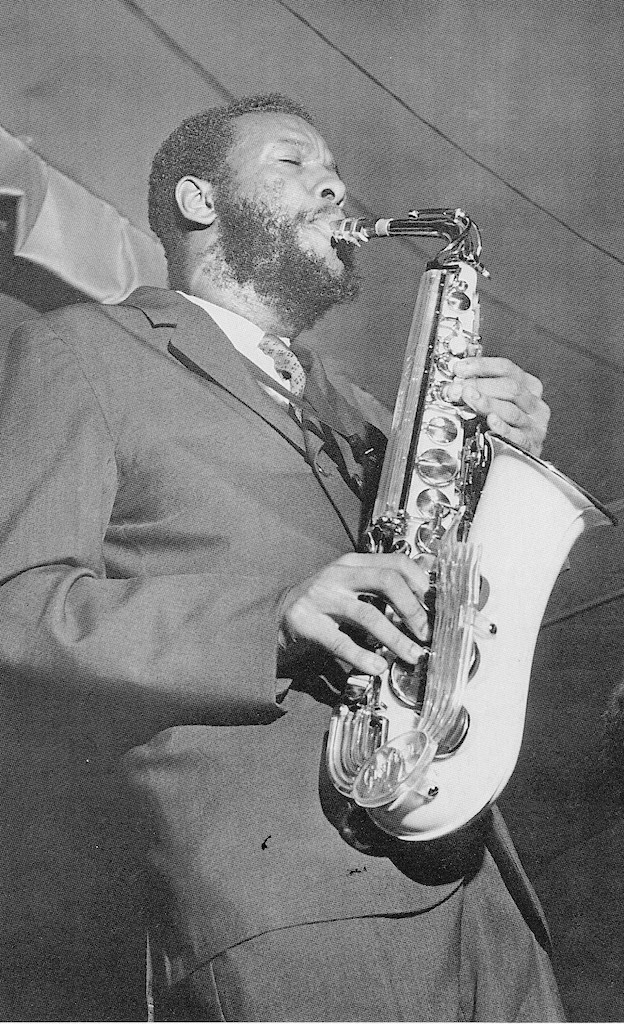The weary jazz fan is understandably a little sceptical when yet another New Star is heralded. Too often in recent years, when novelty has been at a premium, young players of promise have been enthusiastically haiied as the new trend setters. Time has often shown their talents to be meagre, and some, whose stature has later grown to genuine strength, have had the critical obstacle of their own deflated reputations to overcome. It is with these reservations in mind that this writer approaches the enigma of Ornette Coleman.
The Five Spot Cafe has rarely seen a Tuesday night audience to match the size of the group of devotees and jazz industry brass that attended the double debut of the Ornette Coleman Quartet and The Jazztet, co-led by Art Farmer and Benny Golson.
Hearing Ornette Coleman for the first time in person is a distressing experience, even after some brief acquaintance with his recordings. The listener cannot fully appreciate Coleman without divorcing from his mind all ideas as to how modern jazz should sound. It was just such a plight that faced an earlier generation when they first heard Charlie Parker, for his music, too, did not sound like jazz as they then knew it. This exposed the fallacy upon which most jazz criticism was then based, and today we are well aware that jazz is a personal means of expression (admittedly within certain conventions) rather than a particular sound or style.
The lesson of this earlier schism should not be lightly forgotten however, for have we not been guilty too of building a conventional sound-picture of modern jazz; a picture of consolidated Bird-lore with some archaeological strolling through the roots?
In Ornette Coleman, and his trumpeter Don Cherry, we are faced with men whose technique does not permit complete expression of their intensely original and poignant ideas
In Ornette Coleman, and his trumpeter Don Cherry, we are faced with men whose technique does not permit complete expression of their intensely original and poignant ideas. Moved by the sincerity and the passion indicated, the listener cannot help being disturbed by the unresolved ideas as the musicians reach for aims they can only partly communicate. The mixture of creativity and inadequacy left this writer limp, excited but bewildered, and in fact the most immediately satisfying member of the group was bassist Charlie Haden, a crouching swinger with an unusual style conditioned by the requirements of Coleman’s music. Don Cherry, a young man skinny to the point of nothingness, and with stature and stance that recalls a certain Lautrec lithograph, puffs vigorously into a miniature trumpet with a Boy Scout bugle tone, contributing an eccentricity of appearance that aptly matches the uncouth beauty of his improvisation. Drummer Billy Higgins looks delighted, as well he might, for his rhythmic patterns are themselves a novelty in this age of percussive booby traps. Following Coleman’s Wellsian time-machine is no easy task, and Higgins, though not impressive as a soloist, fulfils the exacting rhythm role with distinction. The leader himself is a mild, diffident man of thirty, seemingly incapable of causing a fuss, but in the unlikely world of reality his contribution to the art of jazz may well be a major one.
It might well be that Coleman will be more important as a composer than as a performer (both John Lewis and Gunther Schuller have endorsed his work), but important he will be
Ornette Coleman has extended the jazz language of Charlie Parker. He has embellished it with highly emotional cries, and almost-disastrous spirals of regurgitated exercises in his struggle with the chordal sound barrier. It would be foolish to describe him as a New Star in the proper sense of that much abused term, for as yet his playing is nothing like as rewarding as that of Johnny Hodges, Paul Desmond, Julian Adderley, or Phil Woods, to name a few diversified talents of major stature. It may never be. It might well be that Coleman will be more important as a composer than as a performer (both John Lewis and Gunther Schuller have endorsed his work), but important he will be.
The contrast could not have been more pointed than by the work of The Jazztet, a group whose style can best be described as conservative modern. This is a polished and well-rehearsed ensemble, reading imaginative and sometimes inspired scores by Benny Golson, and featuring outstanding solos by the leader and his co-partner Art Farmer. Supporting solos by Curtis Fuller and pianist McCoy Tyner were more than adequate if not as moving as those of the distinguished leaders. If at times the quest for tonal variety had the many-muted brass pair making like octupuses on a juggling spree, the result justified the awkward means. Farmer’s fat-toned, lyric trumpet has certainly not been heard to such good advantage since that memorable Swedish session with Clifford Brown. The intervening flirtations with hard funk now seem all the more unfortunate for one whose genuinely graceful approach is a rare quality in jazz.
But in juxtaposition with the earthy crudities of Ornette Coleman, this very excellent band sounded bland and insipid. The wheel has turned full cycle; the Parker revolution has been fulfilled and its latter-day exponents are as musically respectable as the old John Kirby Sextet.
The various experimental groups of the past ten years can now be seen to have been premature, and in some cases self-conscious excursions along false trails. Not until now has the Parker mine been fully consolidated into the rich resources of jazz, and with this consolidation comes the opportunity for further exploration into the sounds that can become jazz.
The development of John Coltrane, the belated recognition and acclaim of Thelonious Monk (who was a whole revolution ahead of his time) and the emergence of Wayne Shorter are other indications of the developments of which Ornette Coleman will be a very important part. This is the threshold.
















